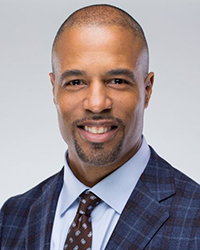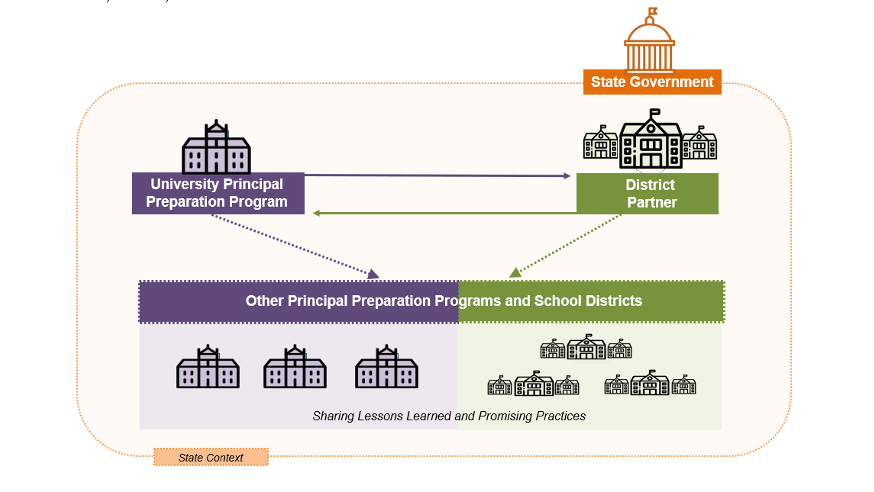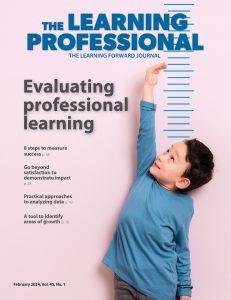When all principals have access to high-quality resources and practical experiences to build their knowledge, skills, and practices for leadership, they are powerful engines for accelerating high-quality teaching and learning.
New research supported by The Wallace Foundation shares clear evidence of the influence principals wield on educator effectiveness, and in turn, student achievement levels and graduation rates. It is crucial that principals receive excellent job preparation and have access to high-quality learning throughout their leadership service.
On June 6, 2022, The Wallace Foundation hosted Strengthening the Bench of Principals: Evidence and Examples from Universities, Districts and States, a webinar featuring two recently published studies supported by The Wallace Foundation reflecting decades of research and study on what kind of preparation and professional learning principals need to help them be effective, support teachers, and contribute to student achievement, as well as the best roles for state and federal governments to play.

Session moderator Frederick Brown, chief learning officer and deputy of Learning Forward, used the new studies as a springboard to lead a timely, solutions-focused discussion with policy experts and practitioners charged with advancing leadership development programming within their districts or universities.
Key takeaways
- High-quality principal learning programs increase success.
- Access to such programs is currently not equitable – it varies across states and by school poverty level.
- What principals learn matters. To become effective leaders, aspiring principals need preparation in the areas of:
- instructional leadership;
- leading and managing school improvement;
- meeting the needs of diverse learners; and
- engaging with school and community stakeholders.
- How principals learn also matters. High-quality internships, applied learning, and clinical experiences prepare aspiring principals for the real-world challenges they will face.
- Investment in state infrastructure is needed to strengthen policymaking. Stronger use of licensure and program approval standards can help ensure principal preparation program integrity. Policies in California, Illinois, Kansas, and Nevada provide compelling examples of what’s working.
- Universities partnering with districts and states can successfully revamp principal preparation programs collaboratively, co-author curriculum, and adopt unique approaches and solutions relevant to their context.
Brown said the new research ultimately will help drive more partnerships, high-quality practical experiences, and better policies to strengthen principal learning.
“While we have long recognized that effective school leaders are an essential element of good schools, the Wallace-funded research represents a major shift in the thinking about how to more collaboratively and equitably prepare principals for their crucial roles,” Brown said. “We now have a much better idea about what content and learning approaches are especially effective. Because access is still a barrier for many, we must, as a learning community, prioritize policies that promote equity in high-quality principal preparation and learning.”
New research supported by @WallaceFdn shares clear evidence of the influence #principals wield on educator effectiveness, and in turn, student achievement levels and graduation rates. Click To TweetEvidence in action
Developing Effective Principals: What Kind of Learning Matters?, one of the reports discussed, focuses on the features and outcomes of high-quality principal learning opportunities and the role of state and federal governments. It was conducted by the Learning Policy Institute (LPI) and informed by more than 20 years of research that includes a review of literature, survey data, and policy reports.
Peter Zamora, director of Federal Relations and Policy at the Council of Chief State School Officers, cited examples of innovative state-led practices aligned with that research. Illinois is using COVID relief resources to fund competitive grants to provide mentoring services to all new principals in the state; Kansas has implemented a leadership training framework for its educational leaders; and Nevada supports a principals leadership network and a rising leaders network for education leaders from historically underserved groups.
“The research described today will inform ongoing efforts to promote effective principal pipelines including federally funded initiatives,” Zamora said.
Daniel Domenech, executive director of the American Association of School Administrators, said the RAND and LPI studies bring into clear focus not only the high-quality content principals need but also the ways in which they are best apt to learn it, citing mentorship, coaching, and clinical experience as examples of strong strategies.
“Sitting in a room where somebody is lecturing you doesn’t do it,” Domenech said. “What does it is to have the ability to be in a situation where you practice these skills to work closely with a principal if you’re not yet a principal. If you are a principal, to visit schools and work with principals who are experienced in the areas that you want to learn. You cannot sit and listen to theory – you need to practice it when you’re seeing it.”
University-focused policy implications
The other study highlighted, RAND’s University Principal Preparation Initiative: A Systemic Approach for Change and Sustainability, was created to capture lessons about how universities revamped their principal preparation programs collaboratively with districts, states, and community partners. The work focused on seven universities receiving The Wallace Foundation grants to implement elements of effective principal preparation programs in line with research-supported practices.
Florida Atlantic University’s Daniel Reyes-Guerra, associate professor, Department of Educational Leadership and Research Methodology, is a member of The Wallace Foundation-supported principal preparation initiative that includes local districts and Florida’s Education Department working collaboratively to improve the profession of school leadership in the state of Florida.
Reyes-Guerra credited The Wallace Foundation for enabling the program redesign at FAU and for creating a platform to share the initiative’s insights widely to benefit the broader field. Meaningful partnerships, he said, have been key to changes in state policy.
“One of the big benefits, in terms of the way that we worked to build our program, was bringing the district on board for that co-construction,” Reyes-Guerra said. “And when you talk about the internships and the pieces that are hands-on work, we designed them making sure that our activities were directly tied to the administrative calendar.”
“It was really important to include our state policymakers so that we heard their perspective, because they see all districts and schools across the state, but also expose them to the ground-level needs for pipeline development so that they can blend that into policies that they are implementing on the state level,” Reyes-Guerra said. “In Florida, this led to creating a whole new set of educational leadership standards and educational leadership program approval standards for both the universities and the districts.”
Rashaunda Tyson, assistant principal at University High School of Science and Engineering in Hartford, Connecticut, participated in leadership preparation from University of Connecticut.
“UConn prepared me well to be an administrator,” Tyson said. “We spent time going over school improvement plans and actually learning how to create them. And that worked well with me starting the school year and going over student learning objectives with teachers.”
“Our district does a great job of the technical things that we need to know in terms of standards and best practices around instructional leadership and how to get our students to perform better overall,” Tyson said. “But what I’m really proud of that my district is doing right now is focusing on restorative practices and also focusing on uncovering people’s biases. We all have implicit biases and just the work of uncovering those that will help us to be better professionals, better toward our students, better toward our school community. And eventually, that will lead to more student outcomes in terms of achievement.”
Brown said developing school leaders is a central part of Learning Forward’s newly revised Standards for Professional Learning.
“I am excited to see findings from two important studies present a path forward for schools, districts, and states and provide further context supporting Learning Forward’s professional learning standards framework,” he said. “Our Principal Action Guide is a great tool for leaders to chart their own path and gain knowledge to help them advocate for policies and practices that support systemic and equitable access to high-quality professional learning.”








